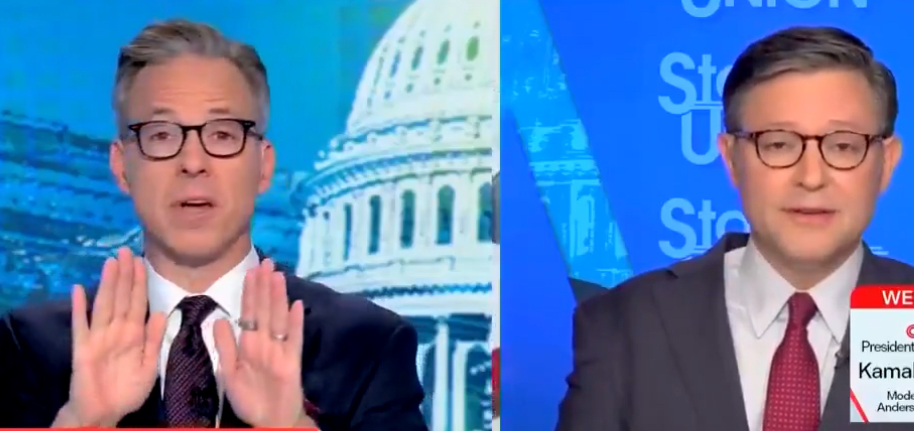In a recent exchange on CNN, House Speaker Mike Johnson left correspondent Jake Tapper flustered with a comedic interaction surrounding remarks made by former President Donald Trump. During a rally in Latrobe, Pennsylvania, Trump humorously referenced his late friend Arnold Palmer and joked about the golfer’s masculinity, leading to Tapper’s somewhat bewildered question regarding Trump’s focus on Palmer’s anatomy. This playful banter unfolded on the network’s “State of the Union,” with Johnson quipping about Tapper’s apparent fascination with Trump’s comments, highlighting the often humorous and contentious nature of political dialogue today.
At the Pennsylvania rally, Trump shared a light-hearted story that painted Palmer, a renowned golfer, as a quintessential manly figure, telling the audience that Palmer’s experiences in the locker room were the stuff of legend. The former president’s jokes included references to Palmer’s presumed endowment, delivered with trademark bravado and a wink at his supporters. In the wake of the uproar some left-leaning commentators aimed at Trump, there seemed to be a disconnect in the outrage being expressed, particularly considering the controversial policies being promoted by leaders like Kamala Harris and Minnesota Governor Tim Walz.
Joining Trump at the rally were notable NFL stars like Antonio Brown and Le’Veon Bell of the Pittsburgh Steelers, who enthusiastically endorsed Trump, critiquing the current administration’s stance on gender issues. Brown particularly took aim at progressive educational policies, suggesting that they were not in line with traditional values. His remarks included a stark denunciation of initiatives like making tampons available in boys’ bathrooms, which he described as “insane.” This perspective seemed to resonate with the crowd, underlining a divide in political ideologies and the rhetoric that surrounds gender issues in today’s society.
Trump’s jibe not only sparked laughter but also touched on broader themes of masculinity that are often debated in contemporary discourse. His acknowledgment of Palmer’s “all man” status underscored a nostalgic affection for traditional gender roles, contrasted with the more progressive views held by certain political figures today. Meanwhile, the reaction from media figures like Tapper reflects a deeper cultural clash—a context where casual humor from political leaders is dissected, while serious discussions about gender identity and education provoke their own controversies.
During the interview with Johnson, the tension became palpable as Tapper struggled to divert the conversation away from the subject he initially raised. Johnson, however, maintained his position, suggesting that Tapper was more focused on the joke than he was. This back-and-forth exchange highlighted the often absurd nature of political commentary, where not only policies but offhand jokes become fodder for extensive media scrutiny. It served as a reminder of how public perceptions are shaped by both humor and serious commentaries, with politicians and journalists often playing off each other in unexpected ways.
Ultimately, the encounter between Tapper and Johnson serves as a microcosm of the current political climate, where humor intertwines with serious policies and ideological divides. Trump’s remarks about Arnold Palmer may have been intended as lighthearted jest, yet they underscore significant cultural conversations about masculinity and gender that permeate modern political discourse. As figures like Johnson navigate these discussions, the challenge remains in balancing humor with sensitivity to broader societal issues, keeping the conversation both engaging and respectful amidst evolving perspectives on gender and identity.

